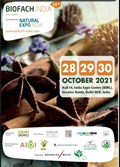
The first session of day 2 of Biofach India 2021 began at 10:30 am on Friday and the focus of the speakers was on Sustainability.
This session was moderated by: Joy Daniel’s who is also the founder and Director of Lipok Foundation and he is also associated with the International Federation of Organic Agriculture Movements (IFOAM) for close to two decades in addition to other networks such as URGENCI International, PGS Organic Council (India), and Biodynamic Association of India (BDAI). Daniel has previously worked with the United Nations Development Programme (UNDP) and GiZ in some other countries of Asia prior to his grassroots work in India.
His opening remarks were on how the sustainable forms of food system managed to improve livelihoods during the pandemic while others fell off.
The session was meant to make farmers understand the need for a multi-dimensional approach to economic activity due to the traditional one-dimensional approach being exposed of its flaws via the pandemic.
This discussion session began with Tapan Ray, Founder and CEO of Pratithi Organic Food Pvt. limited giving some examples and courageous motives taken for sustainable organic agriculture in the industry.
He specifically gave the example of SRI Systematic Rice intensification which is a methodology aimed at increasing the yield of rice produced in farming without the use of fertilizers which he had used extensively in the past few years.
He was of the opinion that the sustainability of organic products doesn’t only depend on the farmer but is also the responsibility of the manufacturers and the producers.
Abhiram Dike was the speaker who followed after him and he gave his insights on how to evolve the organic agricultural practices and make them viable and sustainable for the future.
This sustainability according to him would only arise when organic farming training centers were opened at the grassroots level by the government. According to him, farmers should also be encouraged to start multi-cropping instead of sowing just one seed.
He was followed by Bablu Ganguly the Chairman for Timbaktu Collective who expounded unto the audience how people can band together to fight for sustainability under the Sustainable development Goals. His opinion on how the global south consisted of 90% of the world's farmers while the global north was the market enlightened people on the price intensification of goods. His opinion on The impact of organic farming on food systems was something unique to hear about.
Session two of Day 2 started at 2:30 pm in the afternoon - it was a discussion among the speakers about policy changes that the govt can bring in to help the farmers do organic farming in a more efficient manner.
The moderator of the session was Vishala Kumar G. and the prominent speakers included Dr. Binay Kumar Choudhary who is the current chairman of control union and A.K Yadav Retired Chairman of APEDA.
Their insights on the food safety standards and the lack of a specific research-based institution for Organic farming studies were discussed as some of the main concerns that organic farming culture faces in India. Bharat Bhushan Tyagi, a Padmashree farmer was also present in the meeting.
















